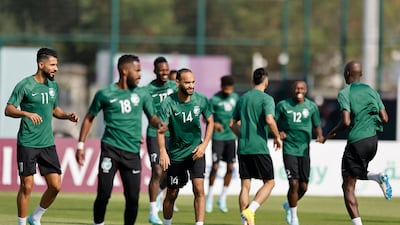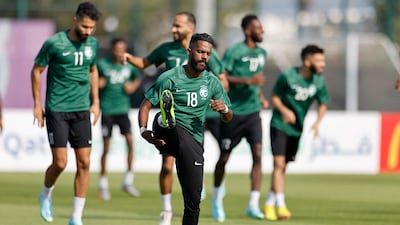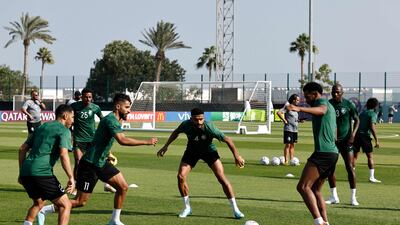After a day of protests, ticketing problems and a glut of goals, the thousands of Argentina fans to have arrived on the streets of Doha will see their idol Lionel Messi take to the field in one last bid for World Cup glory.
Argentina will take on Qatar’s neighbours Saudi Arabia in the first match on Tuesday as the South Americans aim to capture a first World Cup since Diego Maradona’s one-man show in Mexico 86.
Saudi fans have also turned out in large numbers, hoping to cheer their side to a shock victory over one of the tournament favourites.
Holders France will begin their quest to retain their title against Australia in the final match of the day, which kicks off at 11pm GST.
Denmark — semi-finalists at last year's European Championships — will take on Tunisia and seasoned World Cup campaigners Mexico will be in action against Poland on a busy day of World Cup football.
On a Monday morning spent travelling on a near-deserted Metro system to catch a glimpse of the England team as they left for the Khalifa International Stadium from the Souq Al Warka Hotel — a luxury beach resort around 20km outside central Doha — it was clear this was a tournament still finding its feet.
Qatar’s special security officers outnumbered civilians by at least three to one, as helicopters circled overhead and British police officers manned rooftops to scan surrounding areas for potential flashpoints.
Small Brazilian, Chinese and British TV crews assembled to film the England send-off, but the souq area — a popular tourist destination at night — was otherwise deserted.
The Metro is a shining example of Doha’s progress, built from scratch for the World Cup.
It was well used in the build-up to England’s match with Iran, as fans piled onto trains and out onto the stadium concourse.
More security teams were waiting, but with an alcohol ban in place the atmosphere was good natured and finally began to resemble a World Cup.
Expatriate England fans based in Doha were quick to defend their adopted home in the face of global criticism of Qatar’s tournament hosting, while protesting Iranians were more reluctant to speak openly for fear of repercussions on returning home.
Sport City, where the 45,000-seat Khalifa International Stadium sits, is surrounded by four Metro stations offering fast transport around Doha.
As fans headed for exits and poured onto the concourse, three of those stations were closed off, while a lengthy queue was the only access to the solitary station in use.
No explanation was given, forcing fans into more long queues for buses and taxis — many whom raised prices to capitalise on demand.
It left a bitter taste for England fans who had enjoyed an electric start to their World Cup.


















